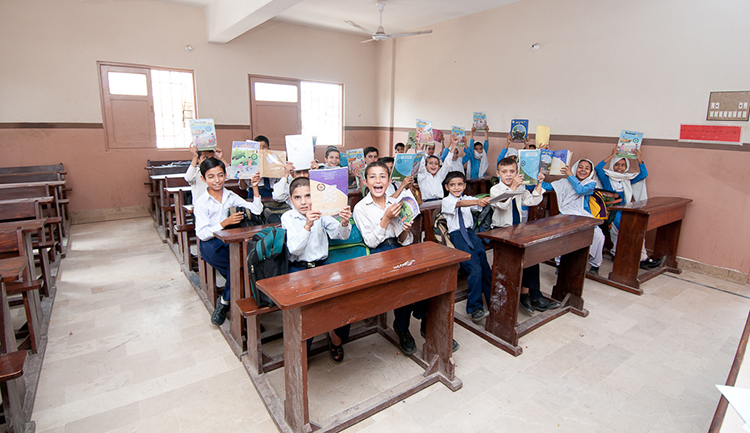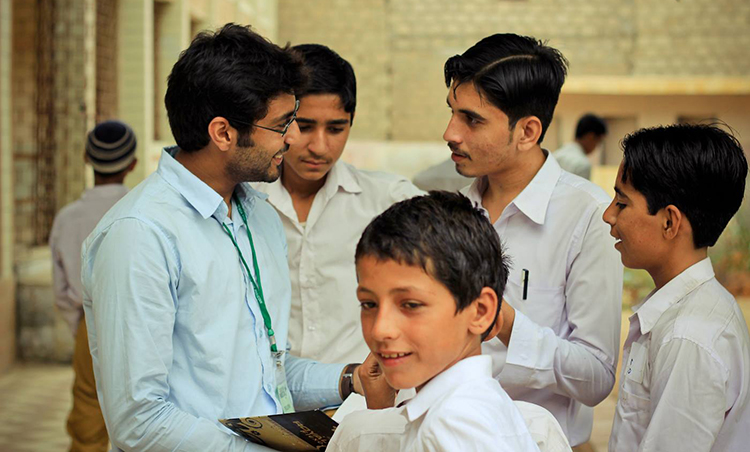Written by: Amna Javed
Posted on: August 13, 2015 | 
Abdullah Ali, Teaching Fellow at TFP
For most people Abdullah’s age, the idea of teaching at public schools for a fixed monthly stipend is hardly the life they imagine after graduating from prestigious colleges. However, for Abdullah, his interest in the education system of Pakistan and the pressing need to fix it was more important.
Having attended elite schools himself, and then moving on to the United States for his undergraduate degree, Abdullah knows the importance of good education and the impact that good teachers can have on the development of an individual student. An economics major, Abdullah, after having detailed conversations with his teachers who mentored him throughout the four years at university, decided to explore economics of education as his niche. However, he did not want to pursue his research in the American context; therefore, he decided to head back to Pakistan and explore it in terms of the country he calls home. “I wanted to come back to Pakistan and participate in the process and ultimately affect what was happening around the country,” he affirmed.

After carrying out a thorough examination of his options, Abdullah began his journey with Teach for Pakistan primarily because of the model that the organization follows. “You have to start sequentially; as the saying goes, ‘think globally, act locally’, and that is what TFP stands for.”
Abdullah, after receiving a rigorous six-week training in Karachi, was placed in an under-resourced school of Lahore, near Canal Road. “The two years that I spent in this locality, was a life-changing experience,” said Abdullah. He elaborated how it is thought that teaching is an easy task, “Its not easy! Especially when one has limited resources,” he exclaimed. Armed with his lesson plans and the drive to bring about a change by playing his part right, Abdullah started teaching 4th and 7th Grade students at this school.
Teaching 120 students, who were all at different levels along the learning curve, was an uphill task for the young fellow, but a more pressing question for those who knew him was how he ended up teaching at a public school when he could have landed a higher paid job in the corporate sector or elsewhere. Abdullah was of the view that if one wants to bring about the change that is so ardently advocated, one must be in touch with the grass roots. He added that it is of utmost importance to know what the actual problems and issues are, and that can only be done once you are acquainted with the grass roots. Most of the people in our education ministry, and those formulating policies regarding the matter, may be competent but are not familiar with the problems that persist at the lowest levels, which is why the policies formulated by them remain ineffective.

When Abdullah initially started teaching, he lived in a posh area of Defense, but gradually he felt that moving closer to people he wants to serve would enable him to work with more empathy, dedication and understanding. Consequently, during his second year, Abdullah moved to the same locality where his school was situated. A senior teacher from the school offered him a room to live in at her house. He narrates that he was apprehensive about shifting from his own home to the school’s locality, but his host family was accommodating and he had a relatively smooth transition. “I felt that my values really aligned with theirs; we prioritized health and education over everything else, and that’s all we talked about.”
Talking about his experience at Teach for Pakistan, Abdullah articulated that although his journey was a mixture of successes and failures, but leaving was never an option for him. In the process of teaching at this under-privileged school, Abdullah ended up learning a lot more himself. “I did have my moments where I had to question myself and my decisions, but that never led me to exploring the option of leaving.” Abdullah credits his survival to his strong support system that includes his family, the school coordinator and his foster family with whom he lived during the second year of his fellowship.
Pakistan has no shortage of young and talented individuals who are always keen to give back to their country in whatever capacity possible. Abdullah is only one such individual. As his fellowship at Teach for Pakistan ends, he aims to join a think tank focused on education. “All I can do from my end is try; even though changing the system is a long term process and it won’t be easy, I still plan to work in the same field and contribute in whatever ways I can.”
You may also like: